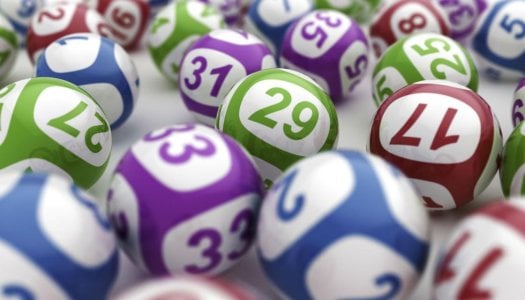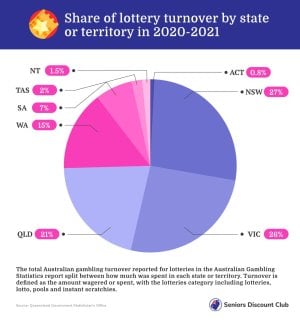New data reveals Australians spend $7 billion on lotteries despite soaring living costs
In the face of escalating living costs, Australians are spending more on lottery tickets and instant scratch cards than ever before.
The latest data from Queensland's Statistician's Office, published in late 2023, revealed that Australians spent a staggering $7.1 billion on lotteries in the 2020-2021 financial year.
This figure is a significant leap from the $4.3 billion spent in 2010-2011 and the $3.4 billion in 2000-2001.
The lottery spending spree encompassed various types of lotteries, including different lottos, pools, and instant scratch-its.

New South Wales residents led the pack, spending a whopping $1.9 billion, followed closely by Victorians at $1.8 billion and Queenslanders at $1.4 billion.
A recent report from the Queensland Audit Office found that Queenslanders lost more than $500 million to lotteries in 2022-2023 alone.
For many Australians, the cost of living crisis is biting hard. Andrea McChrystal, a 30-year-old mother from Tara on Queensland's Western Downs, is feeling the pinch.
'We [recently] did some back-to-school shopping for supplies for the kids, and that was $130 within itself to make sure they've got a fortnight of snacks,' she said.
'I'm praying they don't eat it over the weekend,’ she added.
Despite facing financial difficulties, Ms McChrystal occasionally indulges in the lottery, hoping for a life-changing win.
She has two children with ADHD and ASD and struggles with her own health problems. Winning the lottery would have a significant impact on her life.
'You've got to have hope, you've got to have faith,' she shared. 'Winning the lotto would be a game changer, to get better medical, better outcomes for the kids, better doctors, everything.’
Ms McChrystal also shared that environmental stressors like bushfires have also taken their toll on her family.
‘We actually only just got our power reconnected because the fires took down our power poles,’ she shared.
‘Between that and the [recent] flooding it's been a bit touch and go.’
Associate Professor Alex Russell, from CQ University's Experimental Gambling Research Laboratory, explained that the hope for a better life is what drives people to enter lotteries.
'Everyone kind of does [lotto], rich people, poor people, men, women, a lot of people like the idea of winning a big jackpot,' he said.
'But we see that lower socioeconomic status people, in particular, are the ones who are drawn to it because it offers them a chance to dream what happens if their money problems go away,’ he explained.
However, the reality of winning is starkly different. Dr Russell pointed out that the negative impacts of lotto are not as prevalent as other forms of gambling, but the odds of winning a large jackpot are a dismal one in 100 million.
Relatively speaking, people are more likely to get struck by lightning—a one in 12,000 chance—than win the lottery.
'That's part of the problem. We're pretty bad at interpreting and understanding those big odds,' Dr Russell said. 'We just understand that it's unlikely.'
He added that pokies are the most harmful form of gambling, followed by sports and race betting.
‘It doesn't mean that you're not going to run into problems [with lotto],’ he stated. ‘If you play the lotteries too much, if you sell your house to buy a bunch of tickets on a big jackpot, it's probably not a great idea.’
For news agencies, especially those in regional and rural Australian towns that have lost local newspapers in recent years, lotteries are an important driver for bringing customers through the door.
Sally Bertolotti, the co-owner of a news agency in Dalby, just west of Toowoomba, shared, '[The lotto] does attract people in. It gets them in the shop, then they can have a look around the shop.'
In Queensland, of the $1.9 billion collected in gambling taxes and levies, 20 per cent of that was made up of lotteries taxes.
Dr Russell said historically, lotteries were used in Australia by governments to fund major projects such as the Sydney Opera House and Harbour Bridge.
Several lottery companies used to be owned by state governments, with Lotterywest in Western Australia still government-owned.
The paradox of Australians spending more on lotteries amid a cost of living crisis is complex.
On the one hand, it's a testament to the enduring allure of the lottery dream, the tantalising prospect of a life-changing windfall that could instantly solve financial woes.
On the other, it's a reflection of the financial stress that many Australians are experiencing.
As the cost of living continues to rise, it's more important than ever for Australians to be aware of the true cost of lottery tickets.
While the dream of winning big is as valid as it is enticing, it’s equally true that the money spent on lottery tickets could be better used elsewhere, especially during these challenging times.

What are your thoughts on this issue, members? Have you ever been tempted to spend more on lotteries in the hope of winning big? Share your experiences and thoughts in the comments below.
Those who need help dealing with gambling can contact services like Gambling Help Online on 1800 858 858 or the Financial Counselling Hotline on 1800 007 007.
The latest data from Queensland's Statistician's Office, published in late 2023, revealed that Australians spent a staggering $7.1 billion on lotteries in the 2020-2021 financial year.
This figure is a significant leap from the $4.3 billion spent in 2010-2011 and the $3.4 billion in 2000-2001.
The lottery spending spree encompassed various types of lotteries, including different lottos, pools, and instant scratch-its.

New data revealed that Aussies collectively spent $7 billion on the lottery in 2020-2021. Image source: @NewshubNZ/X (Twitter)
New South Wales residents led the pack, spending a whopping $1.9 billion, followed closely by Victorians at $1.8 billion and Queenslanders at $1.4 billion.
A recent report from the Queensland Audit Office found that Queenslanders lost more than $500 million to lotteries in 2022-2023 alone.
For many Australians, the cost of living crisis is biting hard. Andrea McChrystal, a 30-year-old mother from Tara on Queensland's Western Downs, is feeling the pinch.
'We [recently] did some back-to-school shopping for supplies for the kids, and that was $130 within itself to make sure they've got a fortnight of snacks,' she said.
'I'm praying they don't eat it over the weekend,’ she added.
Despite facing financial difficulties, Ms McChrystal occasionally indulges in the lottery, hoping for a life-changing win.
She has two children with ADHD and ASD and struggles with her own health problems. Winning the lottery would have a significant impact on her life.
'You've got to have hope, you've got to have faith,' she shared. 'Winning the lotto would be a game changer, to get better medical, better outcomes for the kids, better doctors, everything.’
Ms McChrystal also shared that environmental stressors like bushfires have also taken their toll on her family.
‘We actually only just got our power reconnected because the fires took down our power poles,’ she shared.
‘Between that and the [recent] flooding it's been a bit touch and go.’
Associate Professor Alex Russell, from CQ University's Experimental Gambling Research Laboratory, explained that the hope for a better life is what drives people to enter lotteries.
'Everyone kind of does [lotto], rich people, poor people, men, women, a lot of people like the idea of winning a big jackpot,' he said.
'But we see that lower socioeconomic status people, in particular, are the ones who are drawn to it because it offers them a chance to dream what happens if their money problems go away,’ he explained.
However, the reality of winning is starkly different. Dr Russell pointed out that the negative impacts of lotto are not as prevalent as other forms of gambling, but the odds of winning a large jackpot are a dismal one in 100 million.
Relatively speaking, people are more likely to get struck by lightning—a one in 12,000 chance—than win the lottery.
'That's part of the problem. We're pretty bad at interpreting and understanding those big odds,' Dr Russell said. 'We just understand that it's unlikely.'
He added that pokies are the most harmful form of gambling, followed by sports and race betting.
‘It doesn't mean that you're not going to run into problems [with lotto],’ he stated. ‘If you play the lotteries too much, if you sell your house to buy a bunch of tickets on a big jackpot, it's probably not a great idea.’
For news agencies, especially those in regional and rural Australian towns that have lost local newspapers in recent years, lotteries are an important driver for bringing customers through the door.
Sally Bertolotti, the co-owner of a news agency in Dalby, just west of Toowoomba, shared, '[The lotto] does attract people in. It gets them in the shop, then they can have a look around the shop.'
In Queensland, of the $1.9 billion collected in gambling taxes and levies, 20 per cent of that was made up of lotteries taxes.
Dr Russell said historically, lotteries were used in Australia by governments to fund major projects such as the Sydney Opera House and Harbour Bridge.
Several lottery companies used to be owned by state governments, with Lotterywest in Western Australia still government-owned.
The paradox of Australians spending more on lotteries amid a cost of living crisis is complex.
On the one hand, it's a testament to the enduring allure of the lottery dream, the tantalising prospect of a life-changing windfall that could instantly solve financial woes.
On the other, it's a reflection of the financial stress that many Australians are experiencing.
As the cost of living continues to rise, it's more important than ever for Australians to be aware of the true cost of lottery tickets.
While the dream of winning big is as valid as it is enticing, it’s equally true that the money spent on lottery tickets could be better used elsewhere, especially during these challenging times.
Key Takeaways
- Australians spent over $7 billion on lotteries in the 2020-2021 financial year, an increase from previous years, despite cost of living pressures.
- Residents of New South Wales were the highest spenders on lotteries, followed by Victorians and Queenslanders.
- Lotteries offer hope to many, particularly those from lower socioeconomic backgrounds, as a way to dream of solving their financial problems.
- While the probability of winning the lottery is extremely low, lotteries continue to be important for social connection in regional and rural communities, as well as contributing significantly to state tax revenues.
What are your thoughts on this issue, members? Have you ever been tempted to spend more on lotteries in the hope of winning big? Share your experiences and thoughts in the comments below.
Those who need help dealing with gambling can contact services like Gambling Help Online on 1800 858 858 or the Financial Counselling Hotline on 1800 007 007.
Last edited:








